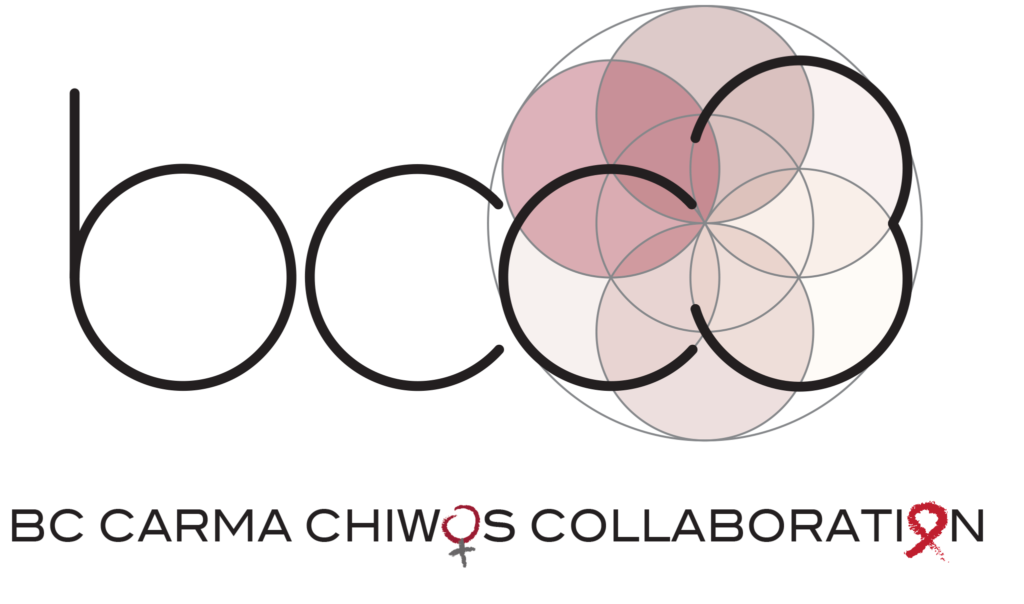British Columbia CARMA-CHIWOS Collaboration (BCC3)
BCC3 is a CIHR-funded collaboration between two existing studies: the Children and women: AntiRetroviral therapy and Markers of Aging (CARMA) study and the Canadian HIV Women’s Sexual and Reproductive Health Cohort Study (CHIWOS). BCC3 is a 5-year, women-centred, community- and clinic-based research project. It brings together women living with HIV, researchers, clinicians, and community partners in British Columbia, with the goal of studying how to improve healthy aging for women living with HIV.
Healthy aging of women living with HIV is influenced by cellular, clinical, and social factors, which also interact with one another. So, BCC3 has several linked study objectives in a cell-to-society approach.
BCC3 Study Timeline

The logo:

BCC3 stands for the British Columbia CARMA-CHIWOS Collaboration. The circles in the seed of life represent the many lenses with which we will investigate women’s health. Together, they allow for the holistic examination of the many inter-related factors affecting women’s healthy aging.
We are investigating:
- How chronic and latent viral infections (HIV, herpes simplex virus, hepatitis C, cytomegalovirus, and others) affect the aging of the immune system and the risk of developing age-related comorbidities or diseases.
- How HIV and other viruses may affect a woman’s hormones levels (e.g. sex hormones or stress hormones), and how this may influence reproductive health outcomes and comorbidities.
- Healthy aging for sexual health, and how this may be influenced by the above factors and socio-structural determinants of health.
With the overarching question:
How is cellular aging in immune cells influenced by chronic/latent viruses, and how might cellular aging be associated with comorbidities, hormones, and social determinants of health in women living with HIV?
The BCC3 study aims to enroll 350 women living with HIV and 350 women not living with HIV in British Columbia. All participants will be asked to complete two study visits: one in person clinical visit at the Oak Tree Clinic at BC Women’s Hospital and another community-based study visit (either in person or remotely) led by a Community Research Associate.
Brief BCC3 Background Information:
With health advances from combination antiretroviral therapy (cART), healthy aging with HIV is a research priority. Globally, women represent more than 50% of the 37 million persons living with HIV, yet remain understudied, particularly in areas related to reproductive health and age-related health diagnoses. Such research is especially important given that women living with HIV face increased morbidity (illness/diagnoses) and earlier mortality (death) compared to men living with HIV. In fact, women living with HIV have a life expectancy 5-10 years shorter than HIV-negative women, and 7 years shorter than men living with HIV. The research that has been done so far hasn’t been able to clearly explain why this is.
Research has taught us that exposure to trauma, violence, poverty, substance use, and experiences of depression, anxiety, and post-traumatic stress disorder can impact stress in the body. In turn, this may affect women’s biology, hormonal regulation, and lifespan. Though we know that people living with HIV experience faster aging in the cells in the body (cellular aging) compared to HIV-negative peers, we also know that women living with HIV have more immune activation/inflammation in the body (see page 3 for explanation), which affect cellular aging and comorbidities. In order to promote healthy aging and guide strategies to prevent comorbidities, we must better understand cellular aging, as well as the factors and pathways that regulate aging in women living with HIV.
To learn more about participation, check out our “Journey Through the BCC3 Study” video!
CARMA – the Children and women, AntiRetrovirals, and Markers of Aging study
The CARMA study team is investigating the effects of HIV and antiretroviral medications on cellular aging in women and children living with HIV, as well as pregnant women and their children. In addition, we are studying the biological health of women living with HIV, including comorbidities, hormone health, and bone health.
CHIWOS – the Canadian HIV Women's Sexual and Reproductive Health Cohort Study
The Canadian HIV Women’s Sexual & Reproductive Health Cohort Study, or CHIWOS, was developed to address these issues, and is rolling out in Ontario, Quebec, and British Columbia, and has been initiated in Saskatchewan and Manitoba. Affiliated with CANOC, this prospective cohort study operates within community based research and GIPA (greater involvement of people with HIV/AIDS) approaches, prioritizing the leadership, and valuing the experiences, of the diverse women who are themselves living with HIV.
